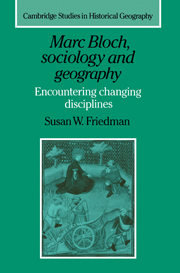Book contents
- Frontmatter
- Contents
- List of tables
- Acknowledgments
- A note on translation
- List of abbreviations
- Introduction
- 1 Marc Bloch and the “Université”
- PART I Sociology, geography, and history during Marc Bloch's years of apprenticeship
- PART II Marc Bloch as a critic and practitioner of sociology and geography
- 6 The University of Strasbourg as a center of disciplinary change
- 7 Kings, serfs and the sociological method
- 8 Reflections on the geographical approach and on the agrarian regime
- 9 An expanding view: Marc Bloch's later projects
- 10 Towards a reworking of the historiography of Marc Bloch
- Notes
- Index of names
- Subject index
- Cambridge Studies in Historical Geography
10 - Towards a reworking of the historiography of Marc Bloch
Published online by Cambridge University Press: 23 November 2009
- Frontmatter
- Contents
- List of tables
- Acknowledgments
- A note on translation
- List of abbreviations
- Introduction
- 1 Marc Bloch and the “Université”
- PART I Sociology, geography, and history during Marc Bloch's years of apprenticeship
- PART II Marc Bloch as a critic and practitioner of sociology and geography
- 6 The University of Strasbourg as a center of disciplinary change
- 7 Kings, serfs and the sociological method
- 8 Reflections on the geographical approach and on the agrarian regime
- 9 An expanding view: Marc Bloch's later projects
- 10 Towards a reworking of the historiography of Marc Bloch
- Notes
- Index of names
- Subject index
- Cambridge Studies in Historical Geography
Summary
Even in his later years when he came closest to Durkheimian sociology, Marc Bloch remained essentially an historian. He was an historian in the sense that his primary interests lay in change and differences rather than laws and theory and that the problems which he chose to address were human ones rather than those of the physical environment. Although not entirely immune from the scientistic atmosphere of the Nouvelle Sorbonne, his vision of history as science was that of the critical documentary method which then defind professional history, rather than the law-seeking of the sociologists or the lapse into biological metaphors of the geographers.
Nevertheless, an understanding of Bloch's relationships to the fields of sociology and geography is essential for an understanding of his approach; although that approach remained historical, the form of history which Bloch developed was deeply marked by those relationships. By transforming history to address some of the concerns brought forward by the sociologists and geographers, Bloch was able to diffuse some of the criticisms his discipline faced. To date, these issues have not been central in the historiography of Marc Bloch, weakening both a comprehension of the particular character of his approach and of how his approach came to be.
- Type
- Chapter
- Information
- Marc Bloch, Sociology and GeographyEncountering Changing Disciplines, pp. 173 - 183Publisher: Cambridge University PressPrint publication year: 1996



